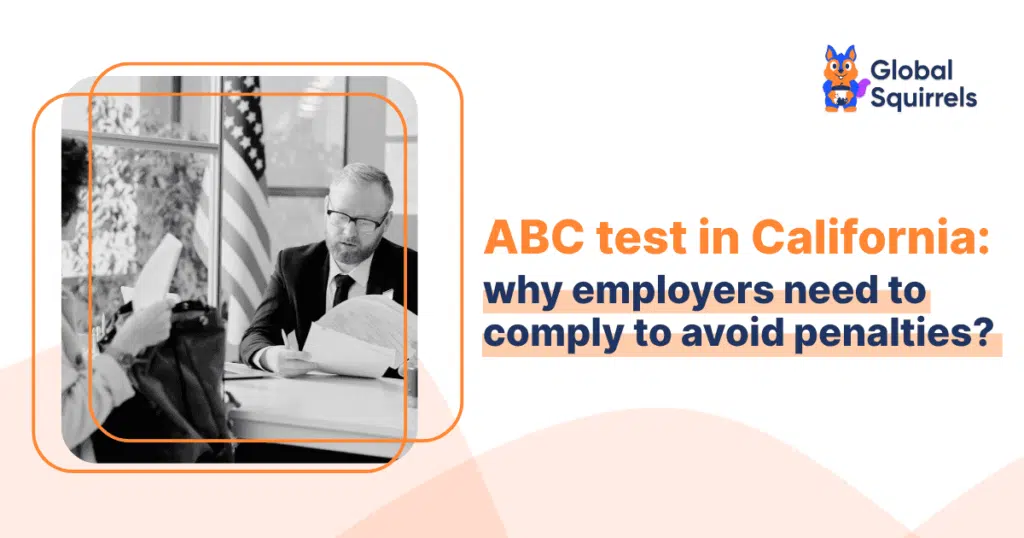ABC test in California: why employers need to comply to avoid penalties?

An attorney posted on Reddit, cautioning small business owners in the USA, “Please don’t misclassify your workers. If you can reasonably bypass the ABC test and keep contractors as contractors, great! But if you use some weird logic to justify them as employees, it will ultimately be a bad decision.”
He then mentioned that one of his clients, who recently started a small business in California, had violated the independent contractor and employee misclassification laws and eventually suffered financial and reputational losses.
California, like many other states, has established stringent regulations to prevent employee-contractor misclassification.
The California Supreme Court established the ABC test in 2018, and then the legislature enacted AB-5 in 2019 to codify and expand upon it.
It has been almost six years since the ABC test came into effect. Yet, some employers remain unaware of it, and this lack of knowledge puts their businesses at a significant disadvantage.
California is a great place to start a business. If you are thinking about moving in this direction, you must be familiar with what the ABC test is and what risks employers face for misclassifying workers, as this is paramount for staying compliant and avoiding costly missteps.
More about worker misclassification: Why it matters?
Imagine a company hires people.
Sometimes, they are referred to as “employees,” and at other times, as “contractors.”
But what’s the big deal?
Employees receive special rules that protect them, including ensuring they are paid a fair wage and have access to certain benefits.
Contractors often don’t receive the same protections.
The debate over the misclassification of workers has prevailed for over a decade.
According to a Harvard Business report, these cases grew by almost 40% between 2010 and 2015 in California.
Week after week, several cases emerged in various sectors like restaurants, residential construction, and logistics, where many employers incorrectly classified their employees as contractors.
Investigations by Government officials further revealed that these employers misclassified their workers, including janitors, home health aides, cable installers, and truck drivers.
In one particular case, construction workers, who were initially employed by a construction company, were later informed that they would be classified as contractors for no apparent reason.
Worker misclassification varies in form, but it has a similar impact on workers and worker-employer relations, including the absence of benefits and federal and state protection, underpayment of wages, and exposure to a variety of risks.
Is employee misclassification illegal?
Yes.
Worker misclassification is illegal, and it carries significant legal and financial ramifications, particularly in California.
Employers sometimes do this to avoid fundamental obligations, such as paying payroll taxes, adhering to minimum wage and overtime laws, or providing essential benefits like meal and rest breaks.
Under Labor Code 226.8, misclassifying a worker can have severe and far-reaching consequences.
Your worker will lose out on:
- Denial of minimum wage, overtime pay, and reimbursement for business expenses.
- No access to workers’ compensation if injured on the job, no paid sick days, and no right to family leave.
- Ineligibility for unemployment insurance, leaving them without support during job loss.
The bottom line is that employee-worker misclassification is considered a form of fraud against both the worker and the state, as it circumvents tax and labor laws designed to ensure fair treatment and a level playing field.
What is the ABC Test and the Dynamex lawsuit?
A company, called Dynamex Operations West, hired drivers to deliver parcels.
It referred to these drivers as “contractors.” However, the drivers were performing their work just like employees, yet they were not receiving employee protections.
So, they went to court in California and presented their case to the judges.
The judges had to determine when someone is truly an employee and when they are a contractor.
On April 30, 2018, the California Supreme Court held in a unanimous opinion that:
- Workers are presumptively employees for the purpose of California’s wage orders and
- The burden is on the hiring entity to establish that a worker is an independent contractor, not subject to wage order protections
To prove someone is a contractor, the company has to pass a special “ABC Test.” They have to show that all three of these criteria are true:
- A: The worker is free to do the job as they see fit, without the company dictating exactly how to do it.
- B: The worker is doing work that’s different from the main business of the company. (Like if a bakery hires a plumber, plumbing isn’t what the bakery mainly does).
- C: The worker has their own business that does this kind of work for other people, too.
If the company can’t prove all three parts of A, B, and C, then the person doing the work is an employee.
As a result of the Dynamex ruling, California enacted a new law, known as AB-5, on September 11, 2019.
How is the ABC Test different from the Borello Test?
Many employers still have a common confusion: should I classify my workers according to the ABC test or the Borello Test?
Let’s break it down for you.
Before the Dynamex ruling and AB 5, the primary standard for determining independent contractor status in California was the Borello Test, derived from the 1989 California Supreme Court case S.G. Borello & Sons, Inc. v. Department of Industrial Relations.
Unlike the ABC Test’s rigid three-prong structure, the Borello Test examines numerous factors to determine the “right to control” the manner and means of accomplishing the desired result.
While no single factor is determinative, the most significant factor is the hiring entity’s right to control how the work is performed.
Other factors considered include:
- Whether the worker is engaged in a distinct occupation or business
- Whether the work is part of the regular business of the hiring entity
- Who supplies the tools, equipment, and place of work
- The worker’s opportunity for profit or loss
- Whether the parties believe they are creating an employer-employee relationship
Compared with the ABC Test, the Borello Test is a more flexible, fact-intensive analysis, where a judge or agency weighs all relevant factors to determine the true nature of the relationship.
No single factor is decisive, and a strong showing in one area can sometimes compensate for a weaker showing in another.
What is the penalty for independent contractor misclassification?
California has some of the strictest laws against independent contractor misclassification, and the penalties for non-compliance are substantial.
The California Department of Tax and Fee Administration conducts regular audits to investigate worker misclassification.
If you are found to have misclassified your independent contractors or employees, you can face:
- Civil penalties:
- $5,000 to $15,000 for each misclassified employee, per violation.
- $10,000 to $25,000 per misclassified worker per violation if determined to be a “willful” pattern or practice
- You will pay all back wages, including unpaid minimum wage, overtime, and premiums for missed meal and rest breaks, along with interest.
- Misclassification leads to unpaid payroll taxes (Social Security, Medicare), unemployment insurance contributions (UI), and state disability insurance (SDI). You will be liable for these back taxes, often with added penalties and interest from both state agencies (like the Employment Development Department, EDD) and federal authorities (IRS).
- Regulatory agencies can issue stop-work orders, temporarily halting your business’s operations until compliance is achieved.
The message is clear: the short-term perceived savings from misclassifying workers are dwarfed by the significant legal and financial risks of non-compliance in California.
How can Global Squirrels’ EOR solution help you prevent worker misclassification?
To hire top global talent and stay compliant with the local labor laws, you can choose from these two options: establish an entity in the foreign country or work with an Employer of Record (EOR).
Setting up an entity in a foreign country will require substantial financial investment, resources, and time.
You need to hire local resources who have a deep understanding of labor laws and regulations. It will also involve a lot of paperwork and approvals from various Government agencies and third parties.
This process is lengthy and time-consuming, often resulting in unexpected delays.
On the other hand, you can skip all the hassle by working with an Employer of Record.
It is a third-party entity that hires independent contractors and full-time employees for your company in the country of your choice.
Whether you want to hire top talent locally in California or manage a remote team in the Philippines or India, an EOR will assume all employer obligations and ensure zero risk to your company while maintaining compliance with labor laws.
Read more: How is an EOR different from an entity set up?
Global Squirrels offers a staffing and payrolling platform that helps small businesses and enterprises hire and manage top local/global talent while ensuring zero risks by staying 100% compliant with local labor laws and regulations.
Whether you want to hire an independent contractor or an employee, or onboard a self-sourced talent, you can choose one of our hiring plans (Orange, Purple, and Blue), and our platform handle all the steps involved, from sourcing profiles based on your job requirements and aligning interviews to onboarding new hires and managing their payroll and benefits.
Here’s how our EOR solution plays a pivotal role in safeguarding your company, especially in California:
- Expertise in labor laws: We are specialists in complex state and federal labor laws, including California’s ABC Test. Our staffing platform will ensure your workers are correctly classified from day one.
- Compliant onboarding: Global Squirrels will handle all legal offer letters and independent contractor agreements, meticulously structuring them to meet classification criteria.
- Payroll & tax management: Our platform will manage payroll, tax withholdings (federal and state), and benefit administration, eliminating your risk of non-compliance and associated penalties.
- Reduced legal liability: By assuming legal responsibility for hiring and managing talent in other countries, our platform will keep your company safe against misclassification claims, audits, and potential lawsuits.
Don’t risk a $25,000 penalty.
Get compliant today—post your job for FREE on Global Squirrels or take a tour of how our staffing and payrolling platform works.


